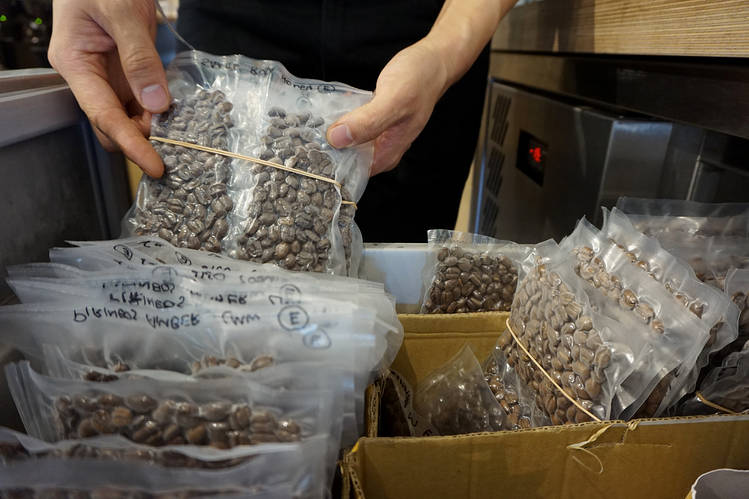Why Brazilian beans are so rich in almost 45% of the world's characteristic flavor of Brazilian beans

Professional coffee knowledge exchange more coffee bean information please follow the coffee workshop (Wechat official account cafe_style)
Brazilian coffee generally refers to coffee produced in Brazil. There is a wide variety of Brazilian coffee, the vast majority of which are unwashed and sun-dried, classified according to the name of the state of origin and the port of transport. Brazil has 21 states and 17 states produce coffee, but four of them produce the largest, accounting for 98% of the country's total output. The taste of Brazilian coffee has a low sour taste, with the sweet and bitter taste of coffee, the entrance is very smooth, but also with a hint of grass aroma, slightly bitter in the fragrance, smooth and smooth, with a pleasant aftertaste.
The Brazilian Fine Coffee Association (BSCA), located in Varginha, South Minas, is a non-profit coffee organization founded by 12 Brazilian coffee producers in 1991.
BSCA aims to improve the quality of coffee production in Brazil, to promote the commercialization and industrialization of Brazilian coffee, and to develop ecological agriculture through cooperation between domestic and international organizations to help the sustainable development of coffee growing areas. Coffee was introduced to Brazil from French Guiana in the 1720s, from a Portuguese captain, Francesco? Paletta, who captured the heart of the then governor's wife in Cayenne, the capital of French Guinea, successfully brought coffee seeds to Brazil. Since then, coffee has adapted rapidly in Brazil, spreading from the north to the southeastern state of Sao Paulo. By 1845, Brazilian coffee beans accounted for 45% of the world's coffee beans and became the main source of income in the state of Sao Paulo.
Brazilian coffee is widely grown in flat areas. In order to adapt measures to local conditions, Brazilian landlords have developed improved Arabica coffee trees that do not require highland or shade decades ago, which can be planted on plains or grasslands and directly exposed to the sun, which is different from the traditional higher altitude shade cultivation.
Most of the Brazilian coffee gardens are only a few hundred meters above sea level, even on flat land. This kind of exposure planting method makes the coffee fruit grow faster, the flavor development is not complete, and the density of beans, that is, the so-called hardness is not as good as plateau beans, the acidity of the fruit is obviously low, the flavor is monotonous, and the coastal Rio coffee even has iodine and salty taste. This flavor is thought to be the result of some kind of microbial action, but even if it is planted in the same soil, it does not necessarily produce this flavor every year. Most coffee hobbies do not appreciate this flavor. Only a few Middle Eastern countries have the habit of sugar and brewing coffee, which is particularly suitable for the flavor of Rio coffee.
The main raw material of instant coffee is also Brazilian coffee beans. When the coffee bean germ is very fresh, it is artificially refined and naturally dried in the vulva for about 60-70 days, so that the sweetness of the pulp fully infiltrates into the bean. Features: coffee beans have a strong aroma, moderate bitterness, high texture acidity, soft overall taste, low acidity and endless aftertaste. The taste of Brazilian coffee has a low sour taste, with the sweet and bitter taste of coffee, the entrance is very smooth, but also with a hint of grass aroma, slightly bitter in the fragrance, smooth and smooth, with a pleasant aftertaste.
Important Notice :
前街咖啡 FrontStreet Coffee has moved to new addredd:
FrontStreet Coffee Address: 315,Donghua East Road,GuangZhou
Tel:020 38364473
- Prev

The world's most expensive coffee beans are among the reasons why these beans are expensive.
Professional coffee knowledge exchange more coffee bean information Please follow the coffee workshop (Wechat official account cafe_style) Coffee is grown and produced in more than 70 countries around the world, coffee drinkers are spread all over the world, and the scale of the coffee-related industry chain is incalculable. Coffee plays different roles in different countries and different historical stages. Some people regard it as a time of worship.
- Next

Coffee beans are so slender: does it taste better when frozen, or does it change when frozen?
Professional coffee knowledge exchange more information about coffee beans Please follow the coffee workshop (official Wechat account cafe_style) from time to time some people ask: can coffee beans be kept in the refrigerator? In general, the answer we get is that it is not recommended to save in this way. However, this does not mean that no one is studying how to freeze coffee beans. Coffee beans are really not built.
Related
- Beginners will see the "Coffee pull flower" guide!
- What is the difference between ice blog purified milk and ordinary milk coffee?
- Why is the Philippines the largest producer of crops in Liberia?
- For coffee extraction, should the fine powder be retained?
- How does extracted espresso fill pressed powder? How much strength does it take to press the powder?
- How to make jasmine cold extract coffee? Is the jasmine + latte good?
- Will this little toy really make the coffee taste better? How does Lily Drip affect coffee extraction?
- Will the action of slapping the filter cup also affect coffee extraction?
- What's the difference between powder-to-water ratio and powder-to-liquid ratio?
- What is the Ethiopian local species? What does it have to do with Heirloom native species?

